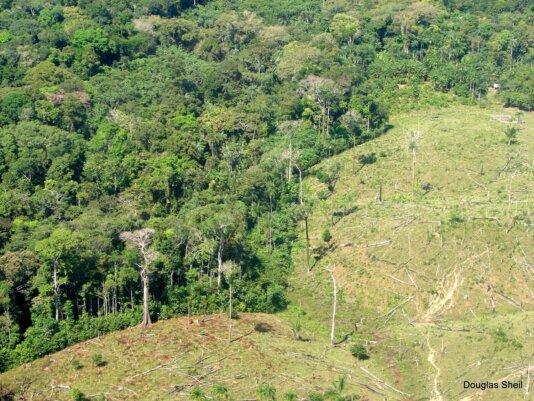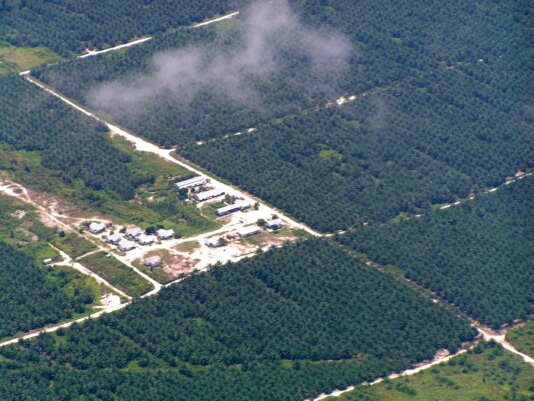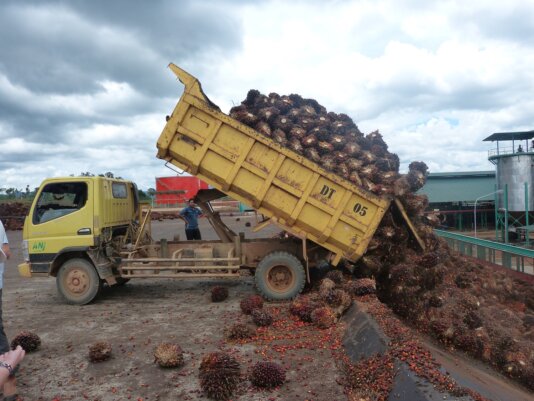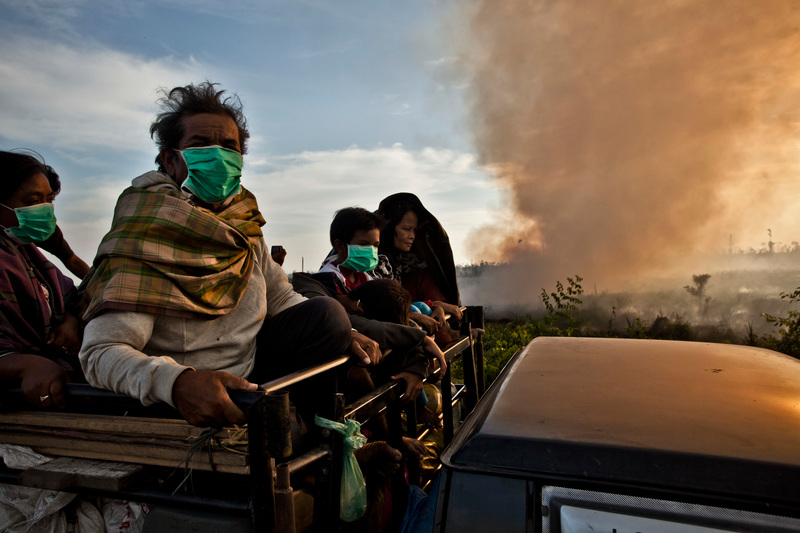- About
- Topics
- Story
- In-Depth
- Picks
- Opinion
- News
- Donate
- Signup for our newsletterOur Editors' Best Picks.Send
Read, Debate: Engage.
| July 24, 2020 | |
|---|---|
| topic: | Sustainable Agriculture |
| tags: | #forest management, #deforestation, #palm oil, #community building |
| located: | Indonesia, Malaysia, Brunei, Philippines, Thailand, Vietnam, Myanmar, Laos, Cambodia, Angola, Cameroon, Central African Republic, Democratic Republic of the Congo, Chad, Republic of the Congo, Equatorial Guinea, Gabon |
| by: | Frank Odenthal |
Coconut products seem to be en vogue these days. Coconut oil, coconut cream, coconut water, coconut chocolate, coconut toothpaste. You find it in body lotion and in hair conditioner. Yet recent studies show that growing coconut palms is much more damaging than its infamous brother, the oil palm. But why is public perception so different?
FairPlanet met Douglas Sheil, an Irish-born professor and expert in forest ecology, management and conservation. He spent ten years in Indonesia with the Centre for International Forest Research (CIFOR) focussing on tropical forests.
FairPlanet: In the public reception coconut is the good plant, whereas oil palms seem to be the evil plant. Why is that?
Douglas Sheil: It‘s obviously a complicated story with many, many factors involved. Over the last twenty years we‘ve seen such a rapid expansion of palm oil plantations, particularly in Southeast Asia. I used to work in Borneo, and Borneo is really the hot spot of palm oil production. And we have pretty good data of how rapidly the forests have been cut down for these oil palm plantations, and that has been accompanied with increased risk of extinctions for many species. It really has been a major driver.
The data on coconut we have tells us that it has also been a big driver of deforestation and of extinctions, but a lot of that has been much slower and it‘s been over the last fifty years or more. So it doesn’t seem to cause such a recent and rapid change, it looks as if it‘s something that we‘re used to. And we also find pictures of coconuts on the beach somewhat charming, I guess. And because we see it as charming we don‘t judge it in the same way. So the reception is partly due to the degree of the perceived threat. And I must say, I share this view, because I lived in Southeast Asia and worked in Borneo. The oil palm plantations pose a threat, and I think it‘s absolutely right that people keep underlining that. I would also underline that. The message, however, is that it‘s not the only risk. It‘s not the only threat to species.
From a biological perspective, are these two plants comparable?
Well, obviously they are both palms, they are both often cultivated in monocultures. They don‘t necessarily need to be grown that way, but they tend to be cultivated in monocultures. They could also be cultivated in mixed systems by smallholders. But it‘s fair to emphasise that none of these things are uniform. These crops tend to have a multitude of ways how to cultivate them, be it a major international company with some tens of thousands of hectares or be it a small villager or be it something in between. I just recently heard someone claiming that coconut is always grown in small plantations and oil palms in big plantations, and that is just not true. Both can be cultivated in many ways. These black and white opinions really are something I would like to dispel.
Oil palm is special because it can produce so much vegetable oil on small areas, and it is also possible to grow them on soils which are inhospitable to alternative crops. So for many people who live in such regions, it seems like an opportunity for development that they would otherwise be lacking. Coconut is special too of course. It isn’t as productive as the oil palm but it also grows in many locations which also lack profitable alternatives. Both palms also play a major role in the lives and cultures of their native ranges, central Africa for oil palm, and the tropical pacific for coconuts.
But both, coconut as well as oil palm, need tropical surroundings…
Oh yes. Both are tropical crops, and both tend to be cultivated in monocultures. But I’ve also seen them growing in mixed gardens too, and there‘s little harm from that unless these gardens add up to cover large areas. It‘s really these large scale plantations that are replacing hundreds of thousands of hectares of forest at a time that we‘re concerned about, though smallholders can and do cause deforestation too.
You just mentioned these negative impacts. Is it possible to put that into numbers, like the hectares lost etc.?
Yes, to a degree. I mean obviously when you‘re in the location and you know what‘s happening, you can see what‘s the cause. With satellite imagery we do measure it to a certain degree. Here are some numbers: oil palm covers around 22 or 23 million hectares worldwide, mostly, over 90%, is in Southeast Asia. Other oil crops cover around 425 million hectares. In Borneo, which has some of the most species rich forests on the planet 18.7 million hectares of old-growth forest were cleared between 1973 and 2015. These are big numbers. You know, I’ve seen these plantations, and it really is such a big problem in some places. But I have also learned that it is more complicated than we assume. The problem is that investors often used the oil palm as an excuse for developing forest areas. They would say to local politicians, “look, the forest is worthless, let‘s convert it into oil palm”, and that way they would get these huge investments of funding to develop these oil palm plantations. And at the same time get all the value from the timber!
That‘s an interesting point…
It‘s a huge windfall of cash when you sell all that timber. It really has a huge value and that creates an incentive. And also the job opportunities! Imagine being a politician, you suddenly have that supply of income you can tax, you suddenly have a lot more money, and you can give employment to everybody. It really has been seen as a big money generator. We had to accept that the value of the oil palm plantations was considerable. But we wanted to stop forests being cleared, so we were saying to people, if you really want to plant oil palm, there‘s a lot of empty space to do so.
But what really surprised me, and I didn’t expect this, was when we actually did the satellite data analysis, where you actually see which bits of forest are being replaced by which oil palm plantation and what was the history of that land before, we actually discovered that a lot of these plantations where being developed on land that had long been deforested. And I have to say, when I found that out I felt embarrassed because I’ve been saying for a long time that they should be doing that, and I was really surprised to see that this was so common already. In Indonesian Borneo (Kalimantan), the majority of plantations had been planted in areas that already have long been deforested.
So what you‘re saying is that when we look more into details, it’s not like black and white anymore?
Exactly. And obviously there are good guys and there are bad guys. And there is still a lot of deforestation. I don’t want to imply otherwise. But the point is you can‘t blame everybody equally for that. If that would happen with some European crop and we would say: Oh, let‘s all stop eating that crop, just because some farmers in Germany or Ireland did this or that, you would say that‘s ludicrous, that‘s not fair. So why are these ludicrous arguments being accepted when we talk about the whole of Southeast Asia? It‘s just unfair, especially when you realise that the majority of plantations are not causing deforestation. Is it just because they are far away that people think that makes sense?
There seem to be different perceptions, probably based on misinformation.
What is really important here, is that we need more transparency about the impacts of what we‘re buying in the shops. The power of the consumer is only realised if the consumers know what they are buying and know the consequences. And I really see huge distortions in that. When I see all that anti-oil palm campaigning, I think a lot of this is crazy. It‘s not properly informed, people just have pictures of dying orangutans in their minds, and believe every single palm oil producer in Indonesia is killing orangutans. It‘s kind of silly. Because, as I said, we would not accept the same kind of blame sharing about European crops. Why should people in Indonesia listen to that? It‘s just not fair! It‘s not that the orangutans are not being killed. Don‘t get me wrong! There are people killing orangutans, that‘s for sure, and those guys should be stopped. But we shouldn’t blame everybody just because they live far away. That‘s not acceptable. And I find that really bizarre as an attitude here in Europe. People in producer countries often see our criticisms as unfair. I think that is because they are often unfair. We wonder why they then dismiss our concerns and and we become more convinced that they are all orangutan killers.
To be more effective we need to be fairer. We need to be consistent. We have to stop grouping everyone just because they grow the same crop. We need to apply the same rules here than we want people to apply far away. We need to avoid double standards.
Would you have an example for those double standards?
Just think about olives! Starting back in the last century, they’ve become a major crop in the south of Europe. Olives from Andalucia in Spain for example are being harvested at an industrial scale by vacuuming the fruits off the trees and simultaneously killing millions of songbirds on their nests. It‘s really shocking. And you would think, wow, that really happens in Europe? And we have to say, yes, this happens in EU-subsidised Europe. But it just doesn’t get the same response and campaigning! Noone is calling for a boycott of olives or demanding bird friendly labels.
Let‘s not forget to talk about the positive impacts of coconut and oil palm plantations. You mentioned job creation for the local communities already. Are there other positive impacts?
It‘s always tricky talking about these impacts, because it always comes with comparisons. Comparisons to what? I‘m specialised in rain forests, and obviously biodiversity issues are different there when you compare it to any crops for example. The impact is different, when you compare it with, say, rice fields. There is never a simple answers, and that is one of the challenges we face when we make any kind of assessments.
If you are a politician in Indonesia for example, and you want to develop land to have some income, then the oil palm is actually better than many other alternatives, because you can actually get a better income on a smaller amount of land or on less deforestation. I can‘t tell in comparison to the coconut, because I haven‘t seen them competing in the same site. They are typically not grown in the same locations, as far as I‘m aware. Coconut isn‘t really competitive in situations where oil palms are being grown. Oil palm would be more profitable. Coconut obviously has some advantages in remote communities though, because it doesn’t have to be processed so rapidly. You have to invest in the processing for oil palm. The fruit has to get to the factory within a day or it already starts to degrade. That‘s a huge investment to build up the processing. But once you have these capacities, it‘s much more profitable to grow oil palms. That‘s why it‘s cultivation has been expanding so rapidly in Southeast Asia at least while the price was high.
When talking about the threats of deforestation and the loss of species due to oil palm plantation, people tend to have in mind images of orangutans. Is there a similar iconic animal that pops up in your mind when you think about coconut monocultures?
Well, in our article we mentioned the Tarsier from one of the smaller islands near Sulawesi. Since it‘s a primate as well, in that sense it‘s probably comparable. It‘s charismatic, it has big eyes… Well, conservation is like this. Different audiences may value very different concerns. But both, the coconut as well as the oil palm, have a list of species that are being threatened by planting in monocultures. I guess the orangutan is more charismatic than most of the other endangered species, that‘s why it gets attention. I don‘t think that this is wrong. But also we know that the coconut has already caused extinction of some species whereas the oil palm is currently just threatening species extinctions.
So, from the scientific perspective, what method to grow either coconut or oil palm would you suggest?
I would like to see growing of these crops only on land that has already been deforested and doesn’t have other values. As much as possible we don‘t want to be seeing any further loss of important habitat. Anything that doesn’t require more clearing. There has been a big discussion in conservation for the last few years about crop systems that are more mixed and more diverse with mixed tree cover that allow more species to occur in the landscape. But the problem is that these low intensity approaches use more land. So ultimately if we want to keep these vulnerable forest dependent species safe and protected, we need to think about also intensifying as possible so as to avoid needing more land.
From today‘s perspective, would it be possible to meet the demand for oil palms just by using empty land?
Definitely in Indonesia we have a lot of previously cleared land that‘s potentially available. I guess we could discuss what “empty” means and what it implies. Some of these areas have frequent fires while others may ultimately recover to be valuable forests. But I would definitely advocate that if you really want to grow high-income crop, whatever that crop is, today it‘s likely to be oil palm, to use those lands where the forests have already been lost. I don‘t have exact numbers, but I suspect there might be another 20,000 square kilometres or so in Indonesia alone. And adding to that, there is potential to make these crops even more productive, there is a lot of work on genetic improvements and improved management in general.
Is there also an ethical aspect to it?
Surely there is. Of course it’s always a trade-off, because you don‘t want to tell people in remote areas of Indonesia, you might have to be poor forever because we have decided that your forest has to stay. These people feel they have huge amount of land, so what‘s the harm of having some of it used for income generation. If we really want to stop forest loss we really have to get into some sort of dialogue with these people. And if we really don’t want them to clear their forests, we should be willing to pay for that. Why should we be making them pay all the costs of it? We in Europe are already wealthy and we deforested most of our land, and now we want to tell people in Borneo, I‘m sorry you live with the orangutans, but we’ve decided they are more important than you are, so stop deforesting. This is how it is heard. I don‘t think it needs to be a choice though. Sometimes people think that, but we don‘t need to choose people or orangutans, we can and should care about both.
Are there any alternatives to oil palms or coconut palms that you could think of?
Well, that really depends on the markets and the demand. There are for example some sugar palms in Southeast Asia which could also be reasonably profitable. But maybe not as profitable. In general, obviously some diversification always comes with some advantages, like communities being more robust, more resilient to external shocks, changes in prices for example, when they have more varieties of plants to make a living. But again, I wouldn’t see why any sort of palm species would be better than any other. We‘re talking about a preference for intensive management, otherwise we‘re still going to be replacing natural habitats. So, I don‘t see that nature would benefit much just by diversification unless we can also save land.
What I would really like to see is a fair and transparent system that rewards producers who protect the environment and penalises those that don‘t. I would like to see it applied everywhere … to producers in Europe, Asia and elsewhere. I would like to see consumers having good information on the impacts of their choices, not assuming all palm oil is bad and all olives or coconuts are good. Not relying on the producers and political voices but having good information that allows us to monitor, track and source commodities.
Douglas Sheil, thank you very much for this interview.
Douglas Sheil is a professor at the Faculty of Environmental Sciences and Natural Resource Management (MINA), Norwegian University of Life Sciences (NMBU), Ås, Norway. His research interests are multidisciplinary and address the assessment and management of biodiversity and ecological processes in changing forest landscapes. His main field experience is in East Africa and Southeast Asia. He worked at CIFOR from 1998 to 2008 and led CIFOR’s Multidisciplinary Landscape Assessment and Life After Logging activities among others. He was born in Ireland.
By copying the embed code below, you agree to adhere to our republishing guidelines.





